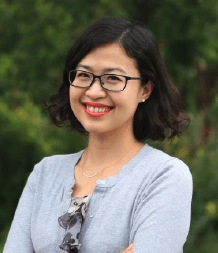For most of her research, Qian Song, PhD, has focused on the intersection of migration, families, institutional discrimination, and health. Primarily, she has pursued questions of how early life experiences create health disparities in later life. Currently, for example, she is looking at the long-term health effects following massive layoffs of State-Owned Enterprise workers in urban China two decades ago.
Qian (pronounced “Chi-an”) Song is the newest member of the UMass Boston gerontology faculty, joining the department in 2019. She came to Boston from the RAND Corporation’s Center for the Study of Aging, where she was a National Institute on Aging postdoctoral scholar. Song was born and raised in China and earned an undergraduate degree in sociology at Peking University. She came to the United States to earn a master’s degree in biostatistics and a doctorate in sociology at SUNY-Albany, then served as a postdoctoral fellow at the Center for Population Dynamics at Arizona State University.
For her doctoral dissertation, Song studied how adult children leaving rural areas for higher paying jobs affects the health of the older parents they leave behind. She has also looked at how the migration of Chinese laborers from rural areas for work in urban areas affected their health.
For her latest work, funded with a two-year grant from the National Institute on Aging, Song and two colleagues at the RAND Center are using the China Health and Nutrition Survey (1989-2015) and the China Health, Retirement Longitudinal Study (2011-2018) to research the health impacts of China’s job layoffs from 1995 to 2004. Close to 70 million Chinese workers lost their state jobs—which carried lifetime salaries, welfare benefits, and social prestige.
“In addition to its strong causal implications, this work is important for aging research because—given its study periods, over two decades of observation—we are able to identify the long-term effects on health, ” Song says.
In December 2021, Song gave a presentation on this research for the UMass Amherst Sociology Department Colloquium. Among her team’s findings: Involuntary job losses increase cardiovascular health risks, peaking at five to 10 years after the job loss and then tapering off. Hypertension, on the other hand, “starts to appear 10 years after the job loss and grows. Chronic stress accumulates,” Song says.
“That surprised me,” she says. “I hadn’t imagined that the timing would be different for various health effects, that after 20 years you would see more hypertension but not so for incident cardiovascular diseases or mortality And economic losses and insecurity do not explain much of the impacts.”
Another research question Song is pursuing is institutional discrimination associated with an hukou status in China (as in being an undocumented immigrant) and how a precarious status has an impact on health. “Those with citizenship status can have better health, but it doesn’t necessarily signal causation,” she says. “The healthy people may be ‘selected’ into citizenship in the first place, and people with adverse health may return and disappear form the data, which creates bias in estimation. So I’m trying to tease out those factors.”
Song enjoys the various ways collaboration occurs between colleagues and students in her new department. “in my previous academic experience, more emphasis was placed on being the solo author or having maybe one or two collaborators,” she says. “The UMass Boston Gerontology culture is really collaborative. Faculty members and graduate students form pretty close relationships while sharing their work.”
The collaborative culture includes crossing disciplines. Song is teaching a class on secondary data analysis for UMass Boston nursing students, and she is collaborating with nursing faculty on a project looking at sexual orientation and depression based on a nationally representative survey. From 2000 to 2015, they have found that while the sexual minority young adults in general had a high probability of depression, the gay/lesbian group experienced additional improvement in mental health during the latter part of that time span compared to their heterosexual counterparts.
Gerontology is a promising field, she says, both in the United States and in China, where the population is aging quickly. “It’s particularly an emerging field in China, where the total fertility rate has fallen to an unprecedented level.”


Leave a Reply